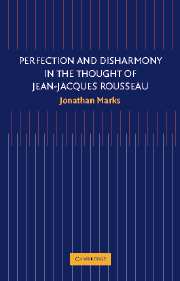Book contents
Introduction: The Natural Perfection of a Naturally Disharmonious Being
Published online by Cambridge University Press: 18 July 2009
Summary
The argument of this book is that Jean-Jacques Rousseau's thought is a reflection on the natural perfection of a naturally disharmonious being. The Rousseau who emerges in the pages that follow, though he is anti-liberal, is more moderate than the Rousseaus to whom one has grown accustomed. This Rousseau has more to contribute to contemporary debates and to our understanding of enduring human problems than those other Rousseaus who are too frequently understood, even by friends, as childlike and fanatical. In order to unearth him, however, it is necessary to dig beneath the centuries of interpretation under which he has been buried and to oppose near unanimities of opinion about his understanding of nature and of human happiness or perfection.
Of course, as the footnotes will confirm, I owe a great deal to other interpreters. Although Rousseau's political and philosophical influence, both real and imagined, has caused him to be even more frequently misinterpreted, I think, than most, he has nonetheless drawn the interest of an extraordinary group of interpreters, from, to speak of the fairly recent past, Leo Strauss to Jean Starobinski to Jacques Derrida. Such interpreters, however much their understanding of Rousseau and how to read him may differ, have read his works with rare insight and painstaking attention to detail. While I will deal in this introduction mainly with how my interpretation differs from the ones I know, and consequently emphasize what I think other interpretations have missed, I know full well that some of my predecessors have forgotten more than I know about Rousseau, and that my own attempt is bound to have missed much.
- Type
- Chapter
- Information
- Publisher: Cambridge University PressPrint publication year: 2005



